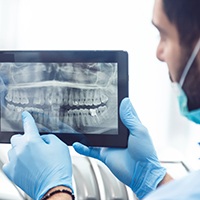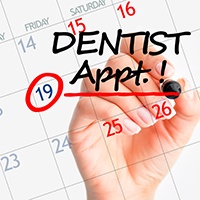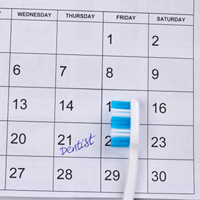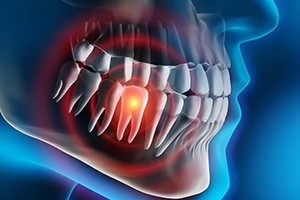Emergency Dentistry – Bloomfield, CT
Fast Relief for Your Pain

Dental emergencies can be frightening and stressful. Adding to that stress, many dental emergencies require immediate attention for optimal care. At Family Dental Practice of Bloomfield, we know that emergencies do not always happen during our dental office hours. That is why we are here 24/7 to help you through any dental disaster. Next time you have a broken, chipped, or knocked out tooth, abscess, soft tissue injury, broken jaw, or other dental emergency, call to reach one of our experienced dental practitioners for emergency dentistry in Bloomfield.
Why Choose Family Dental Practice of Bloomfield for Emergency Dentistry?
- Available 24/7
- Compassionate Care
- Sedation Available
How We Treat Dental Emergencies

- Call Our Office: The first step you should always take if you find yourself in the middle of dealing with a dental emergency is to call our office. Our team will get you in for an appointment whenever you call and get you out of pain as soon as possible. We can also provide you with first aid guidance over the phone to improve your comfort until you reach our practice.
- Come in for an Examination: When you arrive, Dr. Butler and our team will capture X-rays and conduct a thorough examination of your teeth and gums, as well as ask you about your symptoms. Based on Dr. Butler’s findings, he will make a diagnosis and outline a treatment plan for you to get your oral health back on the right track and fix any damage that has occurred.
- Receive Treatment: In some cases, we may be able to conduct the treatment the same day as your examination. If we are not able to, our front desk staff will work with you to schedule the procedure as soon as possible in the following days. We will also walk you through what you can expect to pay out-of-pocket for your treatment.
The Most Common Dental Emergencies
One of the first things you should do when you experience a dental emergency is give us a call. However, even before you get to our dental office for your emergency appointment, there might be some things you can do to manage the situation. Below, we have outlined some common dental emergency situations that we treat, as well as how you can address them in the moments leading up to coming to our office.
Understanding the Cost of Emergency Dentistry

The cost of emergency dentistry can vary quite a bit from case to case. When you come in for your exam, we will be able to provide a price estimate for your unique treatment plan. We also offer some convenient payment options, including financing and insurance. Financial concerns should never hold you back from getting the urgent care that your smile needs!
Every Dental Emergency Is Different

An emergency dental exam is usually a flat fee that is not too expensive. During this appointment, our team will learn about your symptoms, examine your mouth, and do what we can to relieve your discomfort.
The treatments involved in emergency dentistry vary significantly in their costs. For example, crowns can cost quite a bit more than fillings. Root canal therapy has a higher price than extractions, but it is the superior long-term value. Some very simple treatments, such as antibiotics, might be surprisingly affordable.
Our team will present your treatment options and help you understand the pros, cons, and cost of each one.
Does Dental Insurance Cover Dental Emergencies?

Many PPO dental insurance policies cover the cost of one emergency exam each year. Depending on the details of your coverage, this portion of your care might be 100% covered. Emergency treatments are also often covered. Minor services, such as fillings and simple extractions, are typically 80% covered, whereas more extensive procedures may be around 50% covered. Our team welcomes insurance, and we will be happy to help you understand how your benefits apply.
Other Options for Making Dental Emergencies Affordable

Beyond insurance, there are other provisions that might help with the financial aspect of your dental emergency:
- Essential Dental plan. This discount plan is designed for patients without insurance. Signing up is easy, and you can start using your benefits right away.
- We work with third-party lenders, including CareCredit and Sunbit, to provide low-interest payment plans for our services. The application process is quick, and most patients are readily approved for credit. You may even be able to choose a monthly payment amount that fits your family’s budget.
Our team will do all we can to help you understand your payment options. Feel free to ask questions — we do not want the monetary side of your care to cause any more stress than it has to!
Taking Care of Your Smile Can Save You Money

Due to worries about money, some individuals delay dental visits. When they first get a toothache, they might push through the pain and hope that the problem resolves itself. Remember, though, that dental problems only tend to get worse over time. The longer you delay care, the more likely it is that you will end up needing extensive (and pricey) treatment. It is financially smart to seek care at the first sign that something is wrong!
It is also important to remember the benefits of preventive care. By regularly visiting us for checkups, we may be able to catch and treat most dental problems before they even come close to causing an emergency.
Keys to Preventing Dental Emergencies

Our emergency dental office in Bloomfield will do all we can to help you if you run into an urgent oral health problem. However, we are sure that you would prefer to prevent such a situation from ever occurring! While you cannot totally eliminate the chances that you will face a dental emergency, you can lower your risk by applying some simple tips:
Attend Routine Dental Appointments

All adults should attend a routine cleaning and checkup at least twice a year. At these appointments, we will thoroughly examine your teeth with the goal of identifying problems as early as possible. Prompt treatment can prevent minor problems from becoming major emergencies! We will also perform a thorough cleaning, which can get rid of plaque that causes cavities and gum disease. Additionally, we are happy to provide personalized advice to help you care well for your smile at home.
Maintain Good Oral Hygiene Habits at Home

Thorough oral hygiene can get rid of harmful bacteria and protect your mouth from dangerous infections. You should:
- Brush your teeth twice a day. Use a soft brush and be sure to clean along your gumline.
- Floss daily. If you are unsure of proper flossing technique, ask your hygienist to do a demonstration for you during your next cleaning appointment.
- Drink plenty of water. Staying hydrated promotes saliva production and can rinse away harmful food particles.
Make Careful Food Choices

Some foods are much safer for teeth than others. For example, it is best to prioritize nutrient-dense items that promote oral health. Veggies, dairy products, and certain fruits can all be very beneficial. You should also be careful to minimize your intake of sugary and starchy foods, which could promote plaque production in your mouth. Additionally, be very cautious with hard foods that might chip or break a tooth. Popcorn kernels and bone-in meats are both dangerous!
Wear a Mouthguard When Necessary

There are a couple of different types of mouthguards that could help you prevent dental emergencies in Bloomfield:
- If you tend to grind your teeth at night, you may need a nightguard to place a protective barrier between your upper and lower dental arches.
- If you play sports, a custom sportsguard can reduce the risk of injuries to your teeth and gums. It may also lower your risk of concussions.
Do Not Use Your Teeth as Tools

It can be tempting to use your teeth to open packages or bottles. Or, you might use them to trim your fingernails or cut the tags off new clothes. Doing so is unwise! You could easily end up chipping a tooth or causing premature wear and tear to your enamel. Your teeth should not be used for anything other than eating and other basic oral functions. Try carrying a small multi-tool with you so you can spare your teeth from unnecessary force.
Root Canal Treatment

Innovations in dentistry continue to increase the likelihood that patients will be able to keep their natural teeth for life. Dental offices are dedicated to restoring teeth whenever possible and view extraction as a last resort. Advances in root canal treatment make it possible for more people every year to keep teeth that have extensive damage to the inner, soft tooth layers. While root canal therapy is often thought of negatively, the procedure can actually greatly reduce the amount of pain you experience!
Learn More About Root Canal Treatment
Tooth Extractions

We aim to help our patients retain their natural teeth for a lifetime. In some cases, however, one or more teeth must be removed. This may be true if a tooth is extremely damaged, the wisdom teeth are threatening a patient’s oral health, or we must make room for orthodontic treatment. When we must perform an extraction, we do so as gently as possible. Local anesthesia and sedation can ensure you are comfortable while we work.
Learn More About Tooth Extractions
Wisdom Tooth Extractions

Why do dentists almost always recommend extraction of wisdom teeth? In short, because we do not need them — and many patients’ mouths are too small to properly accommodate them. Because most patients retain their molars, the third set can create bite alignment concerns as they emerge. Lack of space can cause the wisdom teeth to become impacted (stuck beneath the gumline). Impaction can also be caused by the angle of the teeth, especially if the wisdom teeth are growing horizontally toward your other teeth. Unremoved wisdom teeth can cause crowding, gum problems, and serious levels of pain.
Learn More About Wisdom Tooth Extractions
Emergency Dentistry FAQs

Will my toothache go away on its own?
Teeth cannot heal themselves, so it is unlikely that your toothache will go away without treatment. If it does go away, it might be because the problem was in the area around a tooth rather than in the tooth itself. This can happen if there is gum damage or swollen sinuses. Another reason why a toothache might go away is much more concerning. Your pain might stop if an infection kills the nerve inside the tooth. However, the infection will continue to spread and may cause significant damage to your jawbone. It might even cause you to become seriously ill. Really, any type of toothache calls for immediate attention from a qualified dentist.
Should I visit the emergency room first for dental emergencies?
Hospital staff members usually do not have the training or equipment required to address a dental emergency in Bloomfield. They might be able to give you some pain relievers or antibiotics, but they cannot address the root cause of the problem. It is usually much better to visit a dentist first for any oral health problem. However, there are exceptions to the rule. If you have a broken jaw, uncontrolled bleeding, a high fever, or any other life-threatening symptoms, you should get to the ER as fast as possible.
My chipped tooth doesn’t hurt. Do I still need to visit the emergency dentist?
Yes, it is always advisable to visit a dentist for a chipped tooth, even if you are not in pain. We will examine the tooth to determine if the damage has affected its inner layers. You might need root canal therapy. Even if root canal therapy is not necessary, your tooth is still vulnerable to further damage, and its sharp edges can irritate the nearby soft tissues. It is generally best not to wait for more than a few days before letting a dentist take a look at a chipped tooth.
What should I keep in my emergency dentistry kit?
The following items can do much to help you handle dental emergencies in a way that minimizes your pain and protects your oral health:
- A small storage container with a lid (for teeth or restorations)
- Sterile gloves
- Gauze pads/dressing
- Cotton balls
- Pain relievers (ibuprofen works well)
- Temporary denture cement (or a similar product)
- Orthodontic wax (if you have braces)
- A topical anesthetic
- Floss
- An ice pack
- Your dental practice’s contact information
- Your dental insurance information
